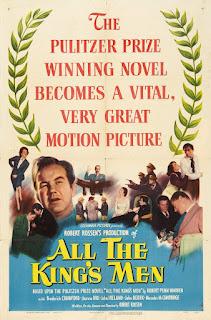
Political corruption has been a key plot point in Hollywood movies for decades, from the “aw shucks” mentality of Frank Capra’s Mr. Smith Goes to Washington to the pessimism of Alan Pakula’s All The President’s Men. In Robert Rossen’s fantastic 1949 film All The King’s Men, we are introduced to a crusader who ends up playing both sides of the political fence, starting out as bright and optimistic about government as Jimmy Stewart’s Jefferson Smith, only to be transformed into the very man he initially wanted to overthrow.
Newspaper reporter Jack Burden (John Ireland) is assigned to cover the campaign of Willie Stark (Broderick Crawford), a small-town yokel running for Treasurer. Burden has been told that Stark is a rarity in the world of politics: he’s an honest man. While following Stark, who is harassed at every turn by his political rivals, Burden realizes everything he’s heard about Willie is true.
Burden writes a series of articles on Stark, who he sees as a decent yet naïve man who ultimately has no hope of winning the election. Sure enough, when the votes are tallied, Willie has been defeated.
As a reward for accepting the assignment, Burden takes a vacation, traveling home to spend time with his mother (Katherine Warren) and family friends, including Judge Monte Stanton (Raymond Greenleaf), the Judge’s nephew Dr. Adam Stanton (Sheppard Strudwick) and Adam’s sister Anne (Joanne Dru), with whom Burden is deeply in love.
Something happens, however, in the months that follow Willie Stark’s defeat: an accident in a school building kills a dozen children, the result of shoddy construction. Which just so happens to be one of the issues Willie Stark was trumpeting during his campaign: construction contracts going to family and friends of the current council members, regardless of qualifications. Remembering his stance on the issue, the public heralds Stark as a voice for the common man, and this newfound popularity lands him a nomination for Governor of the state.
With Burden and Sadie Burke (Mercedes McCambridge) as his advisors, Willie Stark makes a series of informative but uninspiring speeches, not realizing until it’s too late that his nomination was nothing more than a sham, a move designed to split the vote of the “common man” to clear the way for the crooked incumbent to return to office.
Those who set Willie Stark up to take this particular fall, however, come to regret their actions. As it turns out, they’ve only managed to awaken a sleeping giant.
All at once, an angry Willie Stark transforms into a political dynamo, delivering fiery speeches and riling up the “hicks”, who, like him, have had enough of the current administration. Within 4 years, Willie Stark is elected Governor, winning in a landslide.
But he is not the same man he once was; in fact, as his term stretches on, Willie Stark proves himself the most corrupt politician of them all, a fact that grows more apparent to his old pal Jack Burden with each passing day.
Broderick Crawford won an Academy Award for his portrayal of Willie Stark, the political optimist who, before long, lets power and his role as “the voice of the people” go straight to his head. Early on, Crawford plays Stark as a lovable fool, a man who has good ideas but lacks the grace and tact to get them across to the voters. The moment of his transformation (which, incidentally, also comes the day after he got drunk for the very first time) is a tremendous scene, with Willie, enraged by the realization he was just a patsy, delivering a speech that riles up the very people he was meant to corral and placate. Crawford plays it wonderfully, and, like Burden and Sadie, we the audience are happy that Willie Stark has finally unleashed his inner politician.
Willie rides this newfound vigor all the way to the State Capital, where, over time, he’ll make backroom deals with shady characters, doing so for what he calls the “greater good” (this includes the construction of a free hospital that he wants Adam Stanton to run). But as director Rossen shows us, in a hard-hitting manner, all power corrupts, and it isn’t long before Willie Stark has become the type of government official he had initially fought against.
Mercedes McCambridge, in her screen debut, also won a much-deserved Academy Award for her turn as the cynical Sadie, who falls for Stark’s rhetoric a bit harder than most. In addition, Rossen’s expert direction brings an interesting flow to the story: mannered at the outset, frantic in the final act, mirroring first Willie Stark’s humble beginnings, then his meteoric rise.
Even by 1949, corruption of power was a time-honored (read cliché) topic for motion pictures to explore. Yet All The King’s Men does it in a way that never feels like it’s treading on familiar ground. It is a movie that continues to resonate, and is just as vital as ever.
Rating: 9 out of 10
